Actinic keratoses, also known as solar keratosis, sunspots, sun damage are ill-defined rough patches, ranging in colour from pink to brown and measuring from 0.5 to 3cm in width. Some can resemble crusty outgrowths when they are particularly thick and raised.
If an AK starts to bleed or rapidly change in appearance or size this may indicate that it is progressing toward squamous cell carcinoma and medical advice must be sought immediately.
Actinic keratoses are usually harmless, though they can be itchy and feel rough to the touch. Some people also find their appearance unsightly, particularly when they are on the face.
REQUEST A CALL BACK
Arrange a consultation with one of our expert dermatologists today.
WHAT DOES ACTINIC KERATOSES LOOK LIKE?
Actinic keratoses are ill-defined rough patches, ranging in colour from pink to brown and measuring from 0.5 to 3cm in width (see figure). Some can resemble crusty outgrowths when they are particularly thick and raised.
If an AK starts to bleed or rapidly change in appearance or size this may indicate that it is progressing toward squamous cell carcinoma and medical advice must be sought immediately.
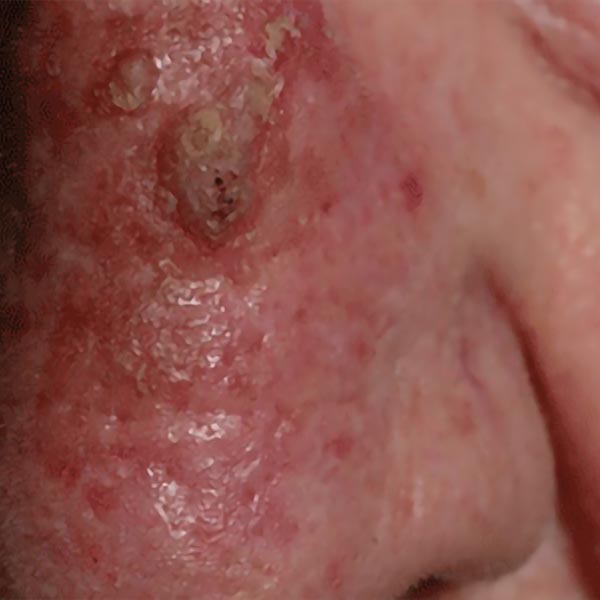
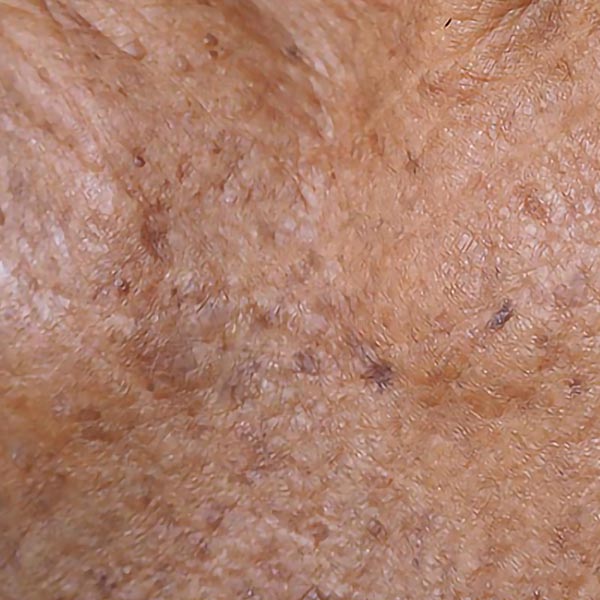
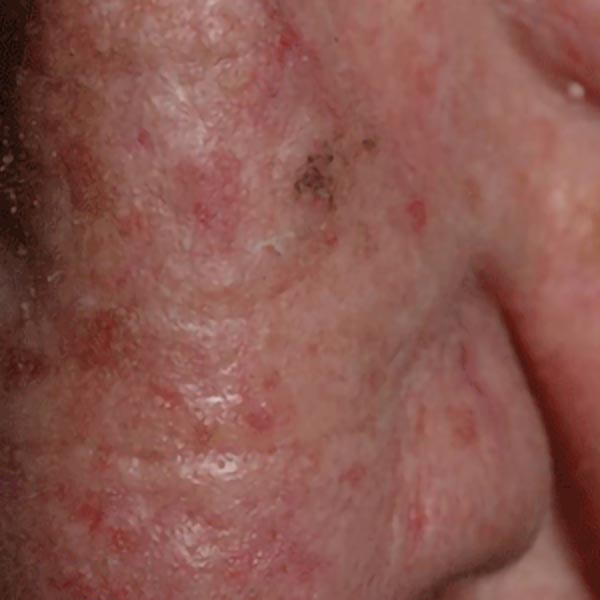
ACTINIC KERATOSES TREATMENT
Actinic keratoses are usually little cause for concern, and small patches may regress by themselves. However, it is important to adopt good sun-protection habits such as using sunscreens and wearing protective clothing on hot days, in order to prevent further skin damage.
Due to the small risk of progression to skin cancer it is generally advisable to treat actinic keratoses. They can also be removed to improve the cosmetic appearance of the skin as a matter of personal choice. A variety of treatments are available and include:
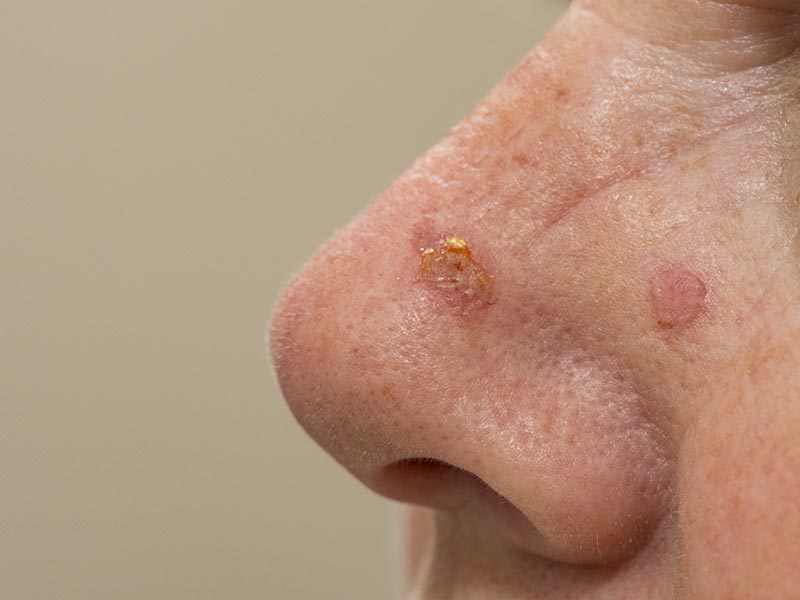
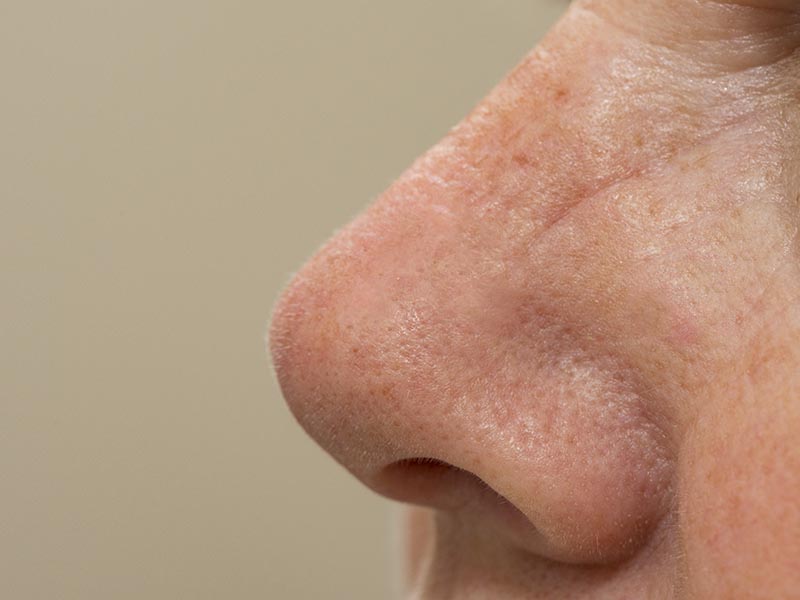
Creams and ointments (5-fluorouracil, imiquimod or diclofenac sodium): these can be used when there are a large number of actinic keratoses, for example on the scalp.
Photodynamic therapy: employs the use of a special cream, which is applied to affected areas and is activated by light of a specific wavelength.
Cryotherapy: involves freezing an affected site with liquid nitrogen.
Curettage or excision: this is performed under local anaesthetic and normally reserved for thicker patches and suspected skin cancers.
Though these options are highly effective, due to prior sun-damage it is likely that more actinic keratoses will develop in the surrounding skin, requiring future treatment.
Our Dermatologists at the Harley Street Dermatology Clinic can offer effective treatment for all types of sun damage including actinic keratoses.
For further information please visit the NHS website and read the British Association of Dermatology Patient leaflet.
FREQUENTLY ASKED QUESTIONS
Where on the body to actinic keratosis usually appear?
As the patches of actinic keratosis are caused by exposure to the sun, they are most commonly found on areas of the body which are exposed to the sun such as the face, hands, arms, legs, ears and scalp.
What can I do if I have actinic keratosis?
If you have patches of actinic keratoses, it is important to get them checked by a dermatologist to reduce the risk of them developing in to skin cancer. To stop getting further patches and to look after your skin it is important to
- use sun cream before exposing your skin to the sun
- wear clothing which will protect your skin from the sun
- do not use sunbeds or sunlamps
- avoid the sun when it is at it’s strongest (between 11am and 3pm)
Does actinic keratosis turn into skin cancer?
Actinic Keratoses are not life-threatening themselves and small patches may disappear on their own but some actinic keratoses can turn into squamous cell skin cancer so can be considered as precancerous. If they are found and treated early, they do not have the chance to develop into skin cancer.
What do patches of actinic keratoses look like?
The patches can feel like sandpaper, they are dry rough and scaly. They usually range in size from 1cm to 2cm and can be itchy. They can either be the same colour as your skin, pink, red or brown.
WHY CHOOSE THE HARLEY STREET DERMATOLGY CLINIC?
Having the right dermatologist is important especially when you have a chronic skin condition that will require ongoing treatment. We want you to feel confident that we’re providing you with the best possible care. We also want you to feel as comfortable as possible with your dermatologist.
The Harley Street Dermatology Clinic specialises in conditions affecting the skin, hair and nails. Our goal is to provide all the care that you need when you’re experiencing these kinds of problems. We want to make it easy for you to access the best quality treatment and support in London.
The clinic is conveniently located in Central London, so it’s easy to visit us if you need to see a dermatologist. You will find yourself in a very comfortable and welcoming environment. We have created a relaxing space where you will receive the highest quality of care. We are regulated by the Care Quality Commission, are part of the British Association of Dermatologists and are top rated by patients of Doctify so you can be sure of safe and effective treatment with us.
CONTACT US
Finding Us
The Harley Street Dermatology Clinic
35 Devonshire Place
London
W1G 6JP
The clinic can be accessed by public transport, on foot or by car. There is paid on street parking around the Harley Street district. The nearest tube stations are Regent’s Park and Baker Street, and Marylebone train station is a 15 minute walk away.
Contact Details
Opening Hours
While appointments can be made available outside usual hours in special circumstances, our core hours are:
Monday: 8am - 6pm
Tuesday: 8am - 6pm
Wednesday: 8am - 6pm
Thursday: 8am - 6pm
Friday: 8am - 6pm
Saturday : 10am - 2pm
Sunday: Closed
REQUEST A CALL BACK
Please fill in this form and one of our team will give you a call back to arrange a consultation with one of our expert dermatologists.
